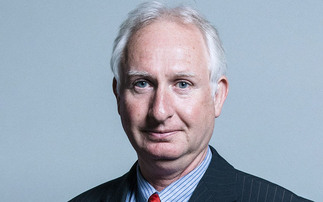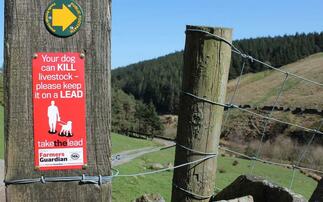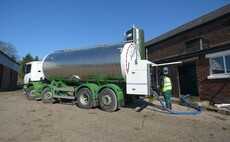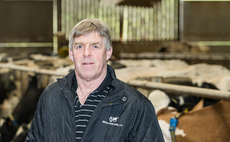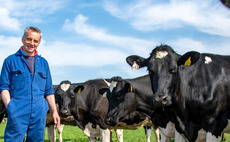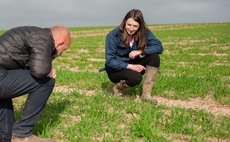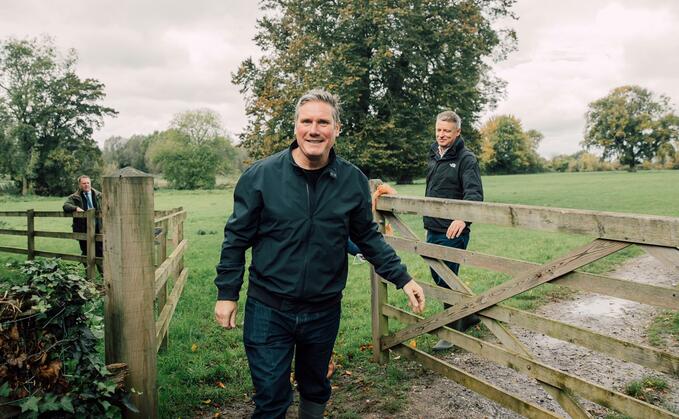
This is a reset moment for British agriculture as the industry works with Sir Keir Starmer's new Government to drive the sector forward and grow.
That was the message from NFU president Tom Bradshaw, adding that whilst Labour's manifesto recognised that food security is national security, improving farm business confidence was crucial.
Labour Government
Mr Bradshaw said: "With British farmers and growers ambitious for the future, what they – and the public – need are practical policies that revitalise farm business confidence and deliver on our shared mission of food security."
He said there were a number of policies within the Labour's manifesto which the NFU will want to see actioned including ensuring the new Environmental Land Management Schemes works for all farm businesses, setting core standards for food imports and legislation to boost public procurement.
"At the same time, there are various issues that need greater recognition if the sector is to unlock its potential for growth, such as a fit for purpose Seasonal Workers Scheme, effective import controls, supply chain fairness, investment in infrastructure and flexibility in planning.
"Our members will also want to see the new Government's commitment to food security by being alert to the risk and impact of disease, particularly bovine TB, as we work towards the government's target to eradicate this terrible disease by 2038. With the latest science showing a 56% decline in TB outbreaks, continuing with an effective and comprehensive eradication plan, which is based on scientific evidence, is essential," Mr Bradshaw said.
Pig farmers
The National Pig Association chief executive Lizzie Wilson said the organisation looked forward to continuing their 'close working relationship' with Steve Reed and the Labour Defra team to 'jointly champion the British pig sector.'
Ms Wilson said: "We offer our wholehearted congratulations to Sir Keir Starmer on this historic election victory. There remain a number of challenges that we must continue working hard to overcome, not least the threat of African Swine Fever in Europe and the need to deliver fairness in the supply chain for our farmers."
Meat and poultry processors
Association of Independent Meat Suppliers (AIMS) said it was critical that the new Government ensure the meat and poultry processing industry have 'access to skilled and affordable labour', adding they will continue to make the case for a 'Migration Advisory Committee.'
Tom Goodger who looks after membership communications at AIMS said their number one priority with respect to overseas trade is to 'restore frictionless movement of POAO products into mainland Europe, adding this can be achieved by establishing a veterinary agreement with the EU.
Mr Goodger said it was essential that the new Labour Government fully recognised that the food industry and its supply chains sit within the UK' 'critical national infrastructure.'
"We urge ministers across Whitehall to immediately take the opportunity to re-classifying those ideologically driven individuals or groups who disrupt supply chains are no longer as ‘activists' but are now treated as ‘criminals' and swiftly dealt with by the courts," Mr Goodger said.
'Tax benefits must be maintained'
Chris Doods, executive secretary of the Livestock Auctioneers Association (LAA) said he was 'uncomfortable' with Labour's lack of pre-election policy and 'chatter' around the badger cull and a rise in taxes.
"They have made suggestions but things need to be discussed in depth. If we are to have a farming industry then the tax benefits need to be maintained. It is very much an empty plate and I am very much looking forward to seeing where they think the UK farming industry should be going."
'Quietly courting the rural vote'
Strutt and Parker's rural research director Dr Jason Beedell said Labour has been ‘quietly and not so quietly courting the rural vote, including landowners.'
READ ALSO: Former Defra Secretary Therese Coffey loses Suffolk seat at General Election
He said: "What isn't expected are large-scale changes to farm policy and agri-environment schemes. Labour representatives have also made public statements that they have no plans to change agricultural property relief on farmland. They also say they will not tell landowners what to grow and the public what to eat and while they do want to ‘improve responsible access to nature' this will not be a right to roam over farmland.
"All of this is not surprising. Labour has been, quietly and not so quietly, courting the rural vote, including landowners. It wants to give the impression that it understands the sector and that it will be supportive of it. At every opportunity the Party has been at pains to reassure the audience and to not scare the horses.
READ ALSO: Sir Mark Spencer loses seat at General Election
"However, it has made commitments on planning and renewable energy generation which do have the potential to change how the countryside looks and works. These will bring both opportunities and challenges for landowners and rural communities."
General Election
Jonty Armitage, Strutt & Parker's head of farming added what farmers needed right now was certainty.
Mr Armitage said: "There has been considerable change in farm support and we are coming towards the end of a seven-year transition period. The sector has largely adapted to the changes and some, like the Sustainable Farming Incentive, are starting to be taken up by a significant proportion of farmers. Labour says that it will ‘improve' the schemes. We don't know what this means but we hope that it means that there will be more focus on skills and training for land managers so that the schemes do actually improve productivity, decarbonise farming systems and deliver the expected environmental outcomes."
Tenant Farmers Association (TFA) chair Robert Martin said the new Government must make its food and farming priorities clear.
Mr Martin said:" With the Party's manifesto containing little detail on its plans for agriculture, we will fast need to understand the new Government's food and farming priorities. I have taken the opportunity of writing to the Prime Minister to set out what the TFA believes needs to be at the top of the incoming Government's in-tray".
Tenant farmers
In the letter to Sir Keir Starmer, Mr Martin asked for his Government to prioritise driving forward the Rock Review recommendations; delivering fairness within the supply chain and designing a policy framework which 'creates a better balance between food, environmental and energy security'
"Currently we are losing too much of our precious farmland to vanity projects like rewilding and other so called ‘green' uses. Farmers are already delivering a huge amount of environmental benefit in terms of biodiversity, landscape and the sequestration and storage of carbon. Corner solutions such as significantly reducing red meat and dairy production or taking out vast swathes of agricultural land for the planting of trees will not be the solution. A land sharing approach as between agriculture and nature must be the way forward.
READ ALSO: Badger culling General Election pledge was 'like a knife between the shoulder blade'
"Too many tenanted farm acres are being lost to solar energy production, tree planting and other development without adequate compensation being paid to the family farm businesses being displaced. That must not be allowed to continue. Food security needs to be higher up the public policy agenda but within a balance which delivers environmental and energy security alongside," Mr Martin said.
Defra
TFA have called for a more joined up approach across the Government departments in Whitehall covering farming, the environment, business, planning and of course the Treasury.
Mr Martin said: " In addition, there will need to be coordination amongst the many statutory agencies and non-departmental public bodies with influence over the areas highlighted. Labour's election victory gives it major opportunity to deliver the change that is needed, and we will work with the new Government to those ends."
Countryside
CLA president Victoria Vyvyan added it was critical the new Government listened and learned from the rural community, adding ‘farmers and rural business owners can so often provide the solutions to the problems that Government faces.
Ms Vyvyan said: "The new Government must hit the ground running. From providing certainty around the farming budget to overhauling the archaic planning system, it needs to go for growth with a robust and ambitious strategy for the countryside.
"The rural economy is 16% less productive than the national average, and closing that gap could add £43bn to UK GVA. With the right support, rural businesses can generate growth, creating good jobs and prosperity for every community."
Guy Coggrave, managing director of GSC Grays warned the potential tax shifts to come with a Labour Government could impact land and farm sales in Northern England.
Northern Ireland farmers
The Ulster Farmers' Union president William Irvine said the union will not shy away from calling out any party or political representative when their stance is unjust towards the farming community, adding he hoped that politicians will do what is right by farm families and consumers, to help the agri-industry to thrive.
Mr Irvine said: "Whilst the politics of Westminster may seem far away and NI's representatives may seem small against a total of 650 UK Parliament members, the vital role that our 18 NI MPs play in representing the voice of farmers in this arena is significant. They are key to helping us deliver a sustainable and profitable future for all UK farmers.
"Although many NI political parties had agriculture policy at the heart of their campaigns, the few references to farmers or food security in the wider UK national debate was noticeable and concerning. With 670,000 people living in rural NI, and the agri-food sector being the backbone of the rural economy, politicians cannot afford to dismiss the importance of farmers in NI and across the UK."
Agricultural Property Relief
"Potential increases in Capital Gains Tax or the removal of Agricultural Property Relief (APR) could further impact the market. Business Property Relief (BPR) is hoped to remain unchanged, but if APR is modified, landowners must ensure their farms are active enterprises to benefit from this relief. Farmers are increasingly using specialist advice focusing on profitability and sustainability of their farm businesses, which is the essence of the Defra funded Farming Business Advice Service (FBAS) we have delivered to over 1,000 farming enterprises this year."
Mr Coggrave said the quality and presentation of farms was increasingly.
"For those who are considering selling, it is advisable to act promptly to make the most of what currently remains a favourable tax regime, which many commentators anticipate will change this autumn or next spring".













